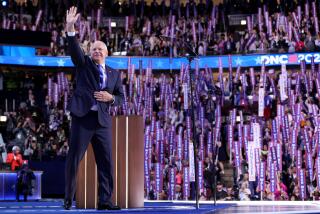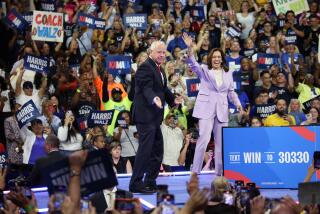GOP convention officials discover deficit just in time
- Share via
ST. PAUL, MINN. — Republican Party officials have developed a well-deserved reputation for planning evermore extravagant national conventions, each built on the party’s ability to secure abundant cash.
But just six weeks before the convention, where Arizona Sen. John McCain is to accept his party’s nomination, executives found they were about $10 million short of what they needed for a celebration they had already scaled back.
Officials say they have already secured most of the funds and that meeting budget needs was never in doubt. Still, this previously unknown -- and rather unusual -- last-minute GOP fundraising headache underscores the challenges facing both parties: A souring economy, complex campaign finance rules and the candidates’ talk of reform has discouraged participation by corporations and the lobbyists who advocate for them.
It also lays bare the pressures facing midsize metropolitan areas such as the Twin Cities and Denver, where local business leaders must join home-state elected officials to plead for tens of millions of dollars in donations from companies and wealthy individuals to cover costs.
Now, officials from both parties are joining campaign finance reform advocates in calling for change.
“It’s a challenge for midsize cities to raise this kind of money for conventions like these,” said Jeff Larson, a GOP political consultant who chairs the Twin Cities convention host committee.
Larson stresses that all of the committee’s obligations and deadlines have been met and that fundraising overall is now in good shape. Still, he said, “I think both the RNC and the DNC recognize they are going to have to find a way to do things a little differently in the future.”
To make up the last $10 million, the Twin Cities host committee relied in part on a wealthy out-of-town GOP donor: Robert Wood “Woody” Johnson IV, owner of the New York Jets and heir to the Johnson & Johnson fortune.
Johnson, a top fundraiser for McCain’s presidential campaign, had already been helping the host committee informally. But on July 18, the local committee named him as the local committee’s national finance chairman. Convention funding sources said Johnson, who has family in Minnesota, tapped other wealthy donors that he knows and was able to raise money quickly.
Host committees do not have to disclose their donors until well after the convention. But party insiders are crediting Johnson with helping to close the gap to within just a few million dollars of the $56.9 million needed to fund the Republican National Convention, which begins Sept. 1.
Johnson could not be reached for comment. But spokeswoman Christyne Nicholas said Johnson “has full confidence that he will be able to close the gap.” She said he was called in as national chair at last minute because of his reputation as “the Brett Favre of political fundraising,” a reference to the star NFL quarterback.
Steve Weissman, a reform advocate with the Campaign Finance Institute, cites the involvement of people like Johnson, and similar fundraising stars tapped by Democrats, as proof that McCain and Obama are in effect collecting large corporate “soft money” checks to be used indirectly on their behalf.
“By law, the presidential candidates themselves cannot receive unlimited corporate contributions,” Weissman said. “But those who are fundraising for them can receive those contributions. . . . and apply it to the biggest advertisement of the presidential campaign, the nominating convention.”
The Democrats’ convention finance problems, more severe and more familiar than the GOP’s, have been evident for months.
Unlike their Twin Cities counterpart, the Democrats in Denver had failed to meet publicly set fundraising benchmarks. And Denver’s woes continue as the party struggles to cover the costs of a speech Obama will give at an outdoor stadium on the convention’s final night.
Sources familiar with Republican convention financing said a problem of that magnitude hadn’t hit the GOP since 1996. Back then, convention planners in San Diego scrambled to raise $3 million to $5 million -- in the six weeks before former Kansas Sen. Bob Dole received the nomination.
Larson, the Twin Cities host committee chair, acknowledges that fundraising has been difficult but says his committee has met all of its fundraising obligations and targets. And he says that neither the Twin Cities, nor the state of Minnesota, will have to spend tax dollars to support the budget of an event expected to bring in tens of millions of tourist dollars.
The last time the Republican elite gathered in Minnesota was in 1892, when the state was solidly in the GOP column.
Today it is a swing state, with a popular Republican governor rumored to have a shot at the vice presidency, which helped make St. Paul an ideal site for a 21st century GOP gathering, even though the Twin Cities themselves lean decidedly Democratic.
What’s more, the Democrats were seriously eyeing the cities for their event. In 2006, the Democratic mayors of St. Paul and Minneapolis approached both parties with offers to host either national convention.
Eager to snatch the site away from their political rivals, officials for the RNC announced that Minneapolis-St. Paul would host the 2008 convention, more than four months before the contracts were signed.
That gamble put the party in a weakened position when negotiating with city officials and forced the RNC to agree to pay for at least one thing -- a police liability insurance policy -- that might otherwise be the responsibility of the host city. The St. Paul convention is receiving none of the multimillion-dollar aid that other conventions, such as the 2000 gathering in Philadelphia, received from local municipalities.
Signs of a growing local buzz in the Twin Cities area were easy to spot last week, with billboards and signs touting the Republican convention. Officials at the Mall of America were getting ready to spruce up the mega-shopping center with red, white and blue bunting while several residents in the neighborhood around the Xcel Energy Center spent their afternoons planting fresh flowers that were the same colors.
With less than a month to go before the festivities begin, Republican officials are also wrestling with the uncomfortable fact that enthusiasm for their event doesn’t appear to be about to break any records.
Nine of the 12 Republicans running in the most competitive Senate races this fall are either skipping the convention or are still weighing whether their time might be better spent campaigning in their home states, according to a recent survey by the National Journal.
Even some of the region’s own leaders -- many of whom are members of the Democratic-Farmer-Labor party, as Democrats here are known -- seem more excited by the Democratic National Convention than the gathering in their backyard.
“I was the first mayor to endorse Barack Obama, so of course I’m excited to go to Denver,” Rybak said. He is looking forward to the Republicans’ arrival, but added: “For us, it’s more about the party than the Grand Old Party.”
Last week, Rybak and other civic leaders and volunteers gathered at a downtown Minneapolis parking lot, where the air was filled with the sound of rumbling taxis -- all there to get spruced up at a cab wash put together by the Republican National Convention.
But some of the volunteers helping the city put its best foot forward couldn’t wash away their disappointment at the guest of honor coming their way.
“I am not a fan of John McCain,” said volunteer Chalyn Rice, 21, a University of Wisconsin-Stout student home for the summer break. “It’d be so great if Barack Obama was coming to our town instead of heading to Denver.”
--
p.j. huffstutter@latimes.com
Hamburger reported from Washington, D.C., Huffstutter from St. Paul. Times staff writer Cynthia Dizikes also contributed to this report.
More to Read
Get the L.A. Times Politics newsletter
Deeply reported insights into legislation, politics and policy from Sacramento, Washington and beyond. In your inbox twice per week.
You may occasionally receive promotional content from the Los Angeles Times.







